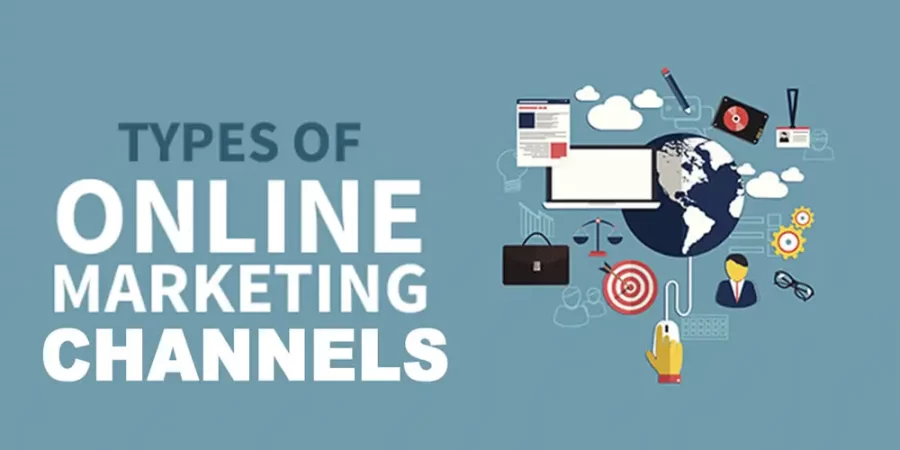What Are The Different Types Of Online Marketing
Online marketing, also known as digital marketing or internet marketing, is the process of promoting products, services or brands through digital channels. The goal of online marketing is to reach a large number of potential customers by using a variety of tools and techniques.
There are several different types of online marketing that can be used, including:
- Search Engine Optimization (SEO): This type of online marketing focuses on improving a website’s ranking on search engines, such as Google or Bing. The goal is to appear at the top of search engine results for specific keywords or phrases that are relevant to the business. This can be done through a combination of on-page and off-page optimization, including the use of keywords in website content, meta tags and link building.
- Pay-Per-Click Advertising (PPC): This type of online marketing involves placing ads on search engines, social media platforms or websites. Advertisers only pay when a user clicks on one of the ads. Popular platforms for PPC advertising include Google AdWords, Bing Ads and Facebook Ads.
- Social Media Marketing: This type of online marketing involves using social media platforms, such as Facebook, Instagram, and Twitter, to promote products, services or brands. Social media marketing can include a variety of tactics such as creating engaging content, running contests or promotions, and paid advertising.
- Content Marketing: This type of online marketing focuses on creating and distributing valuable, relevant and consistent content to attract and engage a specific target audience. The goal is to generate leads, improve brand awareness and ultimately drive sales. This can be done through a variety of formats, including blog posts, infographics, videos, and webinars.
- Email Marketing: This type of online marketing involves sending promotional emails to a list of subscribers. The goal is to keep subscribers engaged and interested in a business’s products, services or content. Email marketing can include a variety of tactics such as newsletters, product updates, and promotional offers.
- Affiliate Marketing: This type of online marketing involves partnering with other businesses or individuals to promote products, services or brands. Affiliates are given a unique link or code to share with their audience, and when someone makes a purchase using that link, the affiliate earns a commission.
- Influencer Marketing: This type of online marketing involves working with individuals who have a large following on social media to promote products, services or brands. These influencers can be celebrities, bloggers, or social media personalities. They can be paid to create sponsored content or be given free products or services to share with their audience.
- Video Marketing: This type of online marketing involves creating and sharing videos online to promote products, services or brands. This can include live streaming events, educational videos, product demos and more. Platforms like YouTube, TikTok, Instagram, and Facebook are popular for video marketing
It is important to note that these types of online marketing can often be integrated together to create a comprehensive and effective marketing strategy. Each type of online marketing has its own set of strengths and weaknesses, and the best strategy will depend on the business’s specific goals and target audience.
In order to build an effective online marketing strategy, business need to understand their target audience, define their goals, and research the various online marketing tactics that will be most effective in reaching their target audience and achieving their goals.
Overall, online marketing has become an essential part of promoting any business in today’s digital age, allowing for a much wider reach of customers in comparison to traditional marketing methods, and providing a multitude of ways to target and reach the desired audience, even on a budget.
In addition to the types of online marketing listed above, there are a few other tactics that can be used to promote businesses online. These include:
- Display Advertising: This type of online marketing involves placing banner ads on websites, blogs or social media platforms. The goal is to promote brand awareness and drive traffic to a website. Display advertising can be done through a variety of platforms, such as Google Display Network and Bing Ads.
- Mobile Marketing: This type of online marketing involves using mobile devices, such as smartphones and tablets, to reach potential customers. This can include tactics such as SMS marketing, mobile apps, and mobile optimization of websites. With the increasing use of mobile devices, mobile marketing is becoming an increasingly important aspect of online marketing.
- Native Advertising: This type of online marketing involves creating content that is designed to blend in with the surrounding content on a website or social media platform. The goal is to promote products, services or brands without interrupting the user’s experience. Native advertising can take many forms, such as sponsored content, sponsored reviews or sponsored social media posts.
- Online PR: This type of online marketing involves using digital channels, such as social media, blogs, and news websites, to promote a business’s reputation and build relationships with potential customers. Online PR can include tactics such as creating press releases, writing thought leadership pieces and engaging with customers on social media.
- Virtual Reality Marketing: This type of online marketing involves creating immersive, interactive experiences to promote products, services or brands. Virtual reality can be used to create virtual tours of a product or service, or create virtual events or experiences that showcase a business. Virtual Reality marketing can be used to create unique engaging experiences that can leave a lasting impression on potential customers.
As we can see online marketing offers a vast array of options to promote a business, and it is essential for any business, especially in today’s digital age, to have a solid online marketing strategy in place. However, it is important to keep in mind that simply implementing one or several of these tactics is not enough, it is crucial to have an overarching strategy that incorporates various tactics and tracks the results to optimize and improve the campaigns. The key to effective online marketing is to understand the target audience, define clear goals, and choose the tactics that will be most effective in reaching those goals.
Overall, online marketing is a dynamic field that is constantly evolving and businesses need to stay up-to-date with the latest trends and technologies in order to stay ahead of the competition and effectively reach their target audience. With the right strategy and tactics in place, businesses of all sizes can effectively promote their products, services, or brands online, resulting in increased brand awareness, customer engagement, and ultimately sales.
Another important aspect of online marketing is measurement and analysis. In order to effectively track the success of an online marketing campaign, it’s important to set clear and measurable goals and use various analytics tools to track progress towards those goals. This can include website analytics, such as Google Analytics, to track website traffic and user behavior, as well as tools to track engagement on social media platforms, such as Facebook Insights or Twitter Analytics.
Measuring and analyzing the results of an online marketing campaign is important because it allows businesses to understand which tactics are working and which are not, and make adjustments accordingly. This can help to optimize the campaign and improve its overall effectiveness. Additionally, measuring and analyzing the results can provide valuable insights into the target audience, including information about their demographics, interests, and behavior. This can help to inform future marketing strategies and campaigns.
Another important element in online marketing is User Experience(UX), UX covers various elements of the website such as, navigation, layout, readability, and many more. A poor User Experience can hurt the overall effectiveness of an online marketing campaign, this is especially important when implementing tactics such as SEO, as having a poor user experience can lead to high bounce rates and low conversion rates.
Furthermore, Personalization of the website is critical for providing an engaging and interactive experience for users. Personalization can be achieved through implementing various tactics such as using cookies to save user preferences, using retargeting ads, using personalized messages, and many more. Personalization can have a positive impact on website engagement and conversion rates.
In addition to the tactics discussed above, businesses can also utilize automation tools to streamline and optimize their online marketing efforts. Marketing automation software can help businesses with tasks such as email marketing, social media scheduling, lead generation and more. These tools can save time and resources and help businesses to stay organized and efficient in their online marketing efforts.
Finally, it is important to remember that online marketing is not a one-time effort, but rather an ongoing process that requires constant monitoring, testing, and optimization. Businesses should regularly review their online marketing strategies and tactics to ensure that they are up-to-date with the latest trends and technologies, and are still aligned with their overall goals and target audience.
In conclusion, online marketing is a vital aspect of promoting any business in today’s digital age. It offers a multitude of options to reach and engage the target audience in order to achieve business goals, it also allows for easy measurement, and personalization to enhance the user experience. Businesses need to have a solid online marketing strategy in place and stay up-to-date with the latest trends and technologies in order to stay ahead of the competition and achieve success online.





Leave a Reply